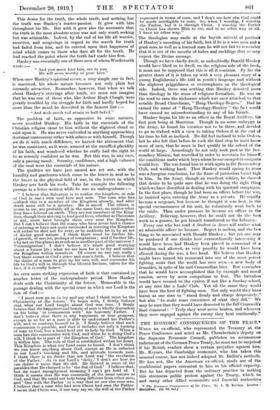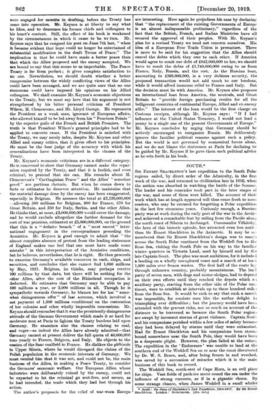THE ECONOMIC CONSEQUENCES OF THE PEACE.* WHEN an ex-official, who
represented the Treasury at the Peace Conference and acted as Mr. Chamberlain's deputy on the Supreme Economic Council, publishes an acrimonious indictment of the German Peace Treaty, he must not be surprised if his British readers show a certain prejudice against him. Mr. Keynes, the Cambridge economist, who has taken this unusual course, has not indeed adopted Mr. Bullitt's methods. He has not, like the American ex-official, made use of the confidential papers entrusted to him in his official capacity. But he has departed from the ordinary practice in making this strenuous public protest against the Treaty, which he and many .other Allied economists and financial authorities • The Economic Consequenms of the Peace. By J. M. Keynes. London • Macmillan. [8s. ed. net.; wore engaged for months in drafting; before the Treaty has 00i110 into operation. Mr. Keynes. is at liberty to say what he likes, and to denounce bis former chiefs and colleagues to his heart's content. Still, the effect of his book is weakened by the circumstances in which it came to be, wr tten. Mr. Keynes says that he resigned his post on- June 7th last, " when it became evident that hope could no longer be entertained of substantial modification in the draft Terms of Peace." The implication is that he could have made a batter peace than that which the Allies proposed and the enemy accepted. We are bound to say that this seems to us improbable. The Peace Treaty is far from perfect ; it gives complete satisfaction to no one. Nevertheless, we should doubt whether a better compromise between the widely conflicting views of the Allies could have been arranged, and we are quite sure that no one statesman could have imposed his opinions on his Allied colleagues. We shall examine Mr. Keynes's economic objections to the Treaty, but we must say here that his argument is not strengthened by his bitter personal criticism of President Wilson, M. Clemenceau, and Mr. Lloyd George. He represents the President as a weak man, ignorant of European affairs, who allowed himself to be led away from.his " Fourteen Points " by the superior guile of the French and British Premiers. The truth is that President Wilson's general principles had to be applied to concrete cases. If the President is satisfied with the Treaty, we may surely infer, despite Mr. Keynes. and other Allied and enemy critics, that it gives effect to his principles. He must be the best judge of the accuracy with which his generalizations have been interpreted in the clauses of the Treaty.
Mr. Keynes's economic criticisms are in a different category. He is concerned to show that Germany cannot make the repar- ation required by the Treaty, and that it is foolish, and even criminal, to pretend that she can. His remarks about M. Clemenceau.'s " Carthaginian Peace" and the Allies' " senseless greed " are partisan rhetoric. But when he comes down to facts or estimates he deserves attention. He maintains that the material damage done by the enemy has been exaggerated, especially in Belgium. He assesses the total at £2,120,000,000 —allowing 500 millions for Belgium, 800 for France, 570 for Great Britain, and 250 for Italy, Serbia, and, the other Allies. He thinks that, at most, £3,000,000,000 would cover the damage, and he would exclude altogether the further demand for the cost of war pensions, estimated at £5,000,000,000, on the ground that this is a " definite" breach " of a " most sacred " inter- national engagement in the correspondence preceding the Armistice. Mr. Keynes is good enough to admit that " the almost complete absence of protest from the leading statesmen of England makes one feel that one must have made some mistake " in this interpretation of the Armistice conditions, but he believes, nevertheless, that he is right. He then proceeds to examine Germany's available resources in cash, ships, and securities, and concludes that she cannot find 1,000 millions by May, 1921. Belgium, he thinks, may perhaps receive 100 millions by that date, but there will, be nothing for the other Allies, after the cost of the Rhineland occupation is deducted. He estimates that Germany may be able to pay 100 millions a year, or 2,000 millions in all. Though he is sympathetic towards Germany, he blames her for her " some- what disingenuous offer " of brat autumn, which involved a net payment of• 1,500 millions conditional on the restoration of her colonies and other wholly impossible concessions. Mr. Keynes should remember that it was the persistently disingenuous attitude of the German Government which made it so hard for moderate men at Paris to lighten the Treaty burdens laid upon Germany. He examines also the clauses relating to ooal, and urges—as indeed the Allies have already admitted—that Germany cannot at present deliver the full, quota of 40,000,000 tons yearly to France, Belgium, and Italy. He objects to the cession of the Saar coalfield to France. He dislikes the pWbi8cite in Upper Silesia, where he would disregard the claims of the Polish population in the economic interests of Germany. We must remind him that it was not, and could not be, the main business of the Allies, in making a Peace Treaty, to consider the Germans' economic welfare. Our European Allies, whose industries were deliberately ruined by the enemy, could not be expected to let the criminal go scot-free, and secure, as he had intended, the trade which they had lost through his action.
The author's proposals for the relief of war-worn Europe are interesting. Here again he prejudices his. case by declaring that " the replacement of the existing Governments of Europe is an almost indispensable preliminary," regardless of the fact that the British, French, and Italian Ministries, have all secured the approval of their peoples. With Mr. Keynes's plan for a revised Treaty we need not concern ourselves. His ides, of a European Free Trade Union is premature. There is more to be said for his suggestion that the, Allies should cancel the debts which they owe to each other. If America. would agree to remit our debt of £842,000,000 to her, we should have to remit the debts of £1,740,000,000 owing to us from France, Italy, Russia, and the rest. As the Russian loan, amounting to £568,000,000, is a very dubious security, the proposed transaction would not add much to our burdens, while it would afford immense relief to France and Italy. But the. decision must lie with America. Mr. Keynes also proposes an international loan from America, the neutrals, and Great Britain. to " provide foreign purchasing credits for all the belligerent countries of continental Europe, Allied and ex-enemy alike." The interest of the loan would be the first charge on Customs receipts, although Mr. Keynes says.: " If I had influence at the United States Treasury, I would not lend a penny to a• single one of the present Governments of Europe." Mr. Keynes concludes by urging that Germany should be actively encouraged to reorganize Russia. He deliberately ignores the familiar political reasons against such a policy. But the world is not governed. by economical forces alone, and we do not blame the statesmen at Paris for declining to be guided by Mr. Keynes if he gave them such political advice as he sets forth in his book.







































 Previous page
Previous page